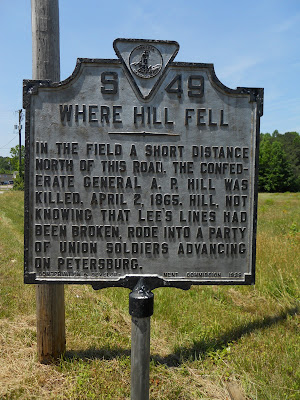Only one man's name was supposedly included in the last words of both Gen. Robert E. Lee and Gen. Thomas Jonathan "Stonewall" Jackson. That man was General Ambrose Powell Hill.
Known to most as A.P. or "Little Powell," Hill was born in 1825 near Culpeper, Virginia. He attended West Point, but illness caused him to lose a year, landing him in the class of 1847. Hill did make it south of the border in time to serve in the Mexican-American War, but only saw limited action.
In 1859, "Little Powell" married the Kitty Morgan McClung, the widowed sister of Kentuckian John Hunt Morgan. Hill called her Dolly. The couple eventually had four daughters, only two of which survived. When the Civil War came, Hill was made the colonel of the Thirteenth Virginia Infantry.
Hill's battle record as regimental, brigade, and division commander was outstanding. For example, his forced but timely march from Harpers Ferry to Sharpsburg on the afternoon of September 17, 1862, helped hold off McClellan's Union forces until night fell.
As corps commander, however, Hill initially struggled. His blunders at Bristoe Station in the October 1863 and North Anna in May 1864, were two instances where he disappointed Lee. At Petersburg, however, Hill seemed to get his footing back. In several actions around the "Cockade City," Hill's forces held their own. But "Little Hill" could not have known that on the morning of April 2, 1865, he would not live see that day's sun go down.
Located less than a mile from where I live three separate historic markers note Hill's demise. The highway marker shown above is posted on Boydton Plank Road (US 1), just south of Duncan Road. It tells part of Hill's last ride.
Hill had returned to duty on March 31, after suffering from a recurring illness due in part from youthful indiscretions while a cadet at West Point. The sometimes debilitating sickness made riding a horse virtually impossible at times. On April 1, Hill spent the majority of the day checking on his troops who were entrenched in earthworks protecting the important supply lines of the Boydton Plank Road and nearby Southside Railroad.
That night the little general eventually made his way to his headquarters in Petersburg. There with him was his pregnant wife Dolly and two of his daughters. That night the Union artillery let loose a massive bombardment on Hill's entrenched troops as a precursor to the assault that would come the following morning at 4:40 a.m.
That assault, led by the Union's VI Corps, broke Hill's lines, which were held by Cadmus Wilcox's Division, consisting of the brigades of James Lane's and Eric Erson's North Carolinians and Edward Thomas's Georgians.
The combination of pain and worry did not allow Hill to sleep. He got up around 3:00 a.m. and went to his headquarters. There he saddled up and went to check on his lines. Hill first rode to Lee's headquarters at Edge Hill where he found the commanding general battling insomnia as well. The men chatted and were soon joined by James Longstreet, whose troops had just arrived at Petersburg.
When one of Lee's officers announced that Hill's Confederate line had been broken, Hill rode off to try to rally his troops. Along with Hill were George Tucker and William Jenkins of his staff, and Charles Venable of Lee's staff. Hill sent Venable off to get some artillery support and proceeded on southwest with the other two.
Before long the riders ran into two Union infantrymen, who they quickly captured. Hill ordered Jenkins to take them to Lee. Hill and Tucker continued to ride on just west of Boydton Plank Road. Hill hoped to make it to General Heth's headquarters to gain more information on the extent of the breakthrough. Before Hill and Tucker could go much farther they bumped into two more Federal infantrymen who had made it to the Southside Railroad and had headed back. Hill immediately wanted to capture them. Tucker went to demand their surrender and Hill yelled at them to throw their guns down.
The two Union soldiers were from the 138th Pennsylvanaia. One, named Mauck, was a corporal, the other, named Wolford, was merely a private. A bold Mauck whispered, "Let us shoot them." Wolford aimed at Tucker and missed. Mauck, however hit Hill. The bullet took off the thumb of the general's extended left hand and then traveled into his chest, passing through his heart. The shot unhorsed Hill. He was likely dead before he hit the ground. Tucker made a break for it and escaped back to report to Lee. The commanding general remarked, "He is now at rest, and we who are left are the ones to suffer." A.P. Hill was killed exactly one week before Lee surrendered to Grant at Appomattox.
Just off of Boydton Plank Road, behind a circled subdivision of duplex apartments, and just down a dirt trail is a small stone maker with the simple words "SPOT WHERE A.P. HILL WAS KILLED." Two wilted wreaths from the 150th anniversary of his death stand near the marker along with two small Confederate battle flags. "Little Powell" is not forgotten.
A.P. Hill photograph courtesy of the Library of Congress.











No comments:
Post a Comment